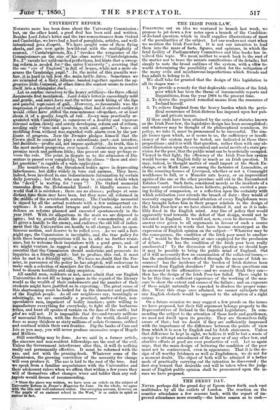THE IRISH POOR-LAW.
Forsownco out an idea we ventured to broach last week, we propose to jot down a few notes upon a branch of the Condition- of-Ireland question, which in itself supplies illustrations of most of the peculiarities of the subject. Let our readers not start when we mention the Irish Poor-law. It is not our intention to lead them into the maze of facts, figures, and opinions, in which the fatal facility of Parliamentary Committees and blue books has in- volved this topic. We mean neither to search back to the root of the matter nor to trace the minute ramifications of its details; but simply to note the broad outlines of the system, with a view to- wards determining the possibility of action for the mitigation of the many evils and mischievous imperfections which friends and foes, admit to belong to it.
We shall take for granted that the design of this legislation in all its stages was- 1. To provide a remedy for that deplorable condition of the Irish poor which has been the theme of innumerable reports and disquisitions, from the year 1804 to the present time. 2. To derive the required remedial means from the resources of Ireland herself.
3. To relieve England from the heavy burden which the perio- dical recurrence of Irish distress has imposed upon her pub- lic and private means.
If these ends have been attained by the series of statutes known as the. Irish Poor-law, the legislative design has been accomplished; and whatever may be thought of its philosophical soundness, its policy, we take it, must be pronounced to be suocessful. The sim- ple issues upon which, as it seems to us, the sufficiency or insuffi- ciency of the system may be tested, are indicated in those three propositions ; and it is with that question, rather than with any ab- stract diseussion upon the economical antisocial merits of a state pro- vision for the poor, that the public mind can be beneficially occupied. 'Viewed in that light, the efficiency of the Irish Poor-law system would become an English fully as much as an Irish question. It may, indeed, be thought matter of small import at the Stook Ex- change, or in Mark Lane, or among the factories of Lancashire, or in the counting-houses of Liverpool, whether or not a Connaught workhouse be full, or a Munster rate heavy, or an improvident squire of the one or the other province sold out in the Encumbered Estates Court. Such facts, considered merely as the incidents of a necessary social revolution, have hitherto, perhaps, excited a pass- ing feeling of compassion, or a reflection upon the certainty with which retribution ever attends the breach of duty : they would of necessity engage the profound attention of every Engliman were they brought before him in their proper relation to the design of the Irish Poor-law as we-have above defined it, and as it is inde- libly fixed in the English mind. Any line of policy that would apparently tend towards the defeat of that design, would not be tolerated in England. It would not, now, oven be discussed. The answer ever given to all arguments in favour of such a course would be repeated in words that have become stereotyped as the expression of English opinion on the subject—" Whatever may be the consequence, the condition of the Irish poor must be amelior- ated," would be the formulary at once employed for the preclusion of debate. But has the condition of the Irish poor been really ameliorated? To the discussion of this question we should hope it may be possible to bring the public mind of England. Out of it will necessarily flow an examination of the collateral issues,— has the amelioration been effected through the means of Irish re- sources? has the incidence of the burden of Irish distress been removed from English shoulders P If none of these questions can be answered in the affirmative—and we scarcely think they can— then has the design of the Irish Poor-law failed. There ought to be by this time a sufficient experience of the working of the mea- sure to show the extent and causes of the failure ; and an exposure of these might naturally be expected to disclose the proper reme- dies. Were this stage once attained, we cannot anticipate tbat any English obstacle would be opposed to the adoption of a right course.
On a future occasion we may suggest a few proofs on. the issues we have proposed, but their full argument belongs properly to the Representatives of Ireland in the Imperial Legislature. In com- mending the subject to the attention of those lords and gentlemen, we need not dwell upon its gravity. They are themselves fully aware of that ; but we doubt if they are sufficiently impressed with the importance of the difference between the points of view from which it is seen by English and by Irish statesmen. Unless that difference be kept in sight, we believe it will be but a waste of energy to attempt amendment of the poor or of any other law, and abortive efforts at good are ever productive of evil. Let us again urge, that the main design of bettering the condition of the poor must not be contravena even in appearance. That it is the de- sign of all worthy Irishmen as well as Englishmen, we do not for a moment doubt. The object of both will be attained if a better mode of practically carrying out the intention be discovered : the first step toward that desirable end will be taken when the judg- ment of English public opinion shall be pronounced upon, the is- sues we have proposed.


























 Previous page
Previous page